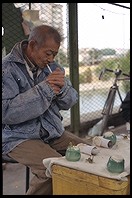
Philip's personal guide to China
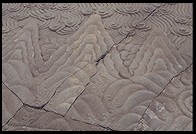

|
Philip's personal guide to China |

|
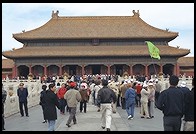 China is not a clean country. China is not an efficient country. China
is not a free country. China is not a country where beauty is generally
carefully preserved. However, China is the most populous country in the
world and the oldest civilization in the world. You can't call yourself
well traveled unless you've been to China.
China is not a clean country. China is not an efficient country. China
is not a free country. China is not a country where beauty is generally
carefully preserved. However, China is the most populous country in the
world and the oldest civilization in the world. You can't call yourself
well traveled unless you've been to China.
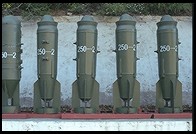 The best months to visit China are spring and fall. Summer is too hot
and dusty in the north, cripplingly humid in the south. Winter is
bitter cold in Beijing.
The best months to visit China are spring and fall. Summer is too hot
and dusty in the north, cripplingly humid in the south. Winter is
bitter cold in Beijing.
The Chinese are avid photographers themselves, which makes street photography easy. However, it will be tough to snap away unnoticed because a foreigner is such an object of curiosity among the Chinese. Inside museums and temples, photography can be restricted.
It will be painfully difficult to buy professional-grade cameras and film in China. Unless you know where to shop you won't even be able to rely on the goods being genuine.
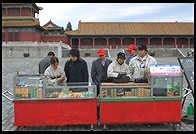
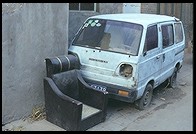 China has liberalized its economy in many ways but all of the old laws
are still in place. Getting in and out of the country is much more
difficult than it would be in the West. You'll need to apply for a
visa. Allow at least a week for the process. It is easier to get a
tourist visa even if you're going on business.
China has liberalized its economy in many ways but all of the old laws
are still in place. Getting in and out of the country is much more
difficult than it would be in the West. You'll need to apply for a
visa. Allow at least a week for the process. It is easier to get a
tourist visa even if you're going on business.
The average Chinese does not speak English but the major tourist
attractions are all signed bilingually. When getting from place to
place, have your hotel concierge write down instructions for your driver
or taxi driver to read.
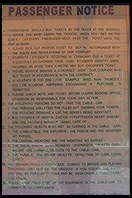
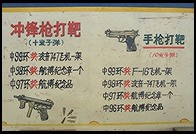
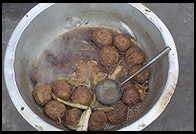 Don't eat fresh fruit or vegetables. Never touch salad. Don't
drink the water. Don't eat in a restaurant where dinner costs less than
a week's wages for a Chinese. The compensation for all of this? You
can eat wonderfully well in the big cities. There is also more variety
than Chinese restaurants in the US. As our Beijing-born friend says
"The Cantonese will eat anything with four legs except the table."
Don't eat fresh fruit or vegetables. Never touch salad. Don't
drink the water. Don't eat in a restaurant where dinner costs less than
a week's wages for a Chinese. The compensation for all of this? You
can eat wonderfully well in the big cities. There is also more variety
than Chinese restaurants in the US. As our Beijing-born friend says
"The Cantonese will eat anything with four legs except the table."
Electric power is 220V, 50 Hz. and plugs will take either American-style two-prong plugs or European round-pin plugs. Most laptop and digital camera power supplies adapt to any voltage between 90 and 240 and therefore will work fine in China.
Anonymous POP Internet service is available from the phone company. Simply dial 2631 or 2632 and log in with username and password both set to "263".
The time in all of China is 8 hours ahead of Greenwich Mean Time (London), which makes it 13 hours ahead of New York. Thus if it is 9:00 am in New York, it is already 10:00 pm in China. China does not observe Daylight Savings Time, so the time difference from New York will be 12 hours in the summer.
The currency in China is the Yuan (RMB). The exchange rate is semi-floating and, as of 2008, you get about 7 Yuan to the dollar (check Yahoo! Finance for the latest rates). Outside of the big cities, it is tough to find ATMs that accept foreign bank and credit cards. Bring lots of US dollars in cash or travelers checks into China.
Considering that the standard and frequently applied punishment for most crimes is death, it is remarkable how much ink tourist guides devote to crime in China. As a foreigner, it will be tough to get into trouble, though, and the country is certainly safer than the US. We never worried about leaving $10,000 of camera gear and laptop computers in our hotel room.
China has one of the world's fastest growing economies (at least 8% GDP growth per year overall, substantially more in the cities and substantially less in the countryside). The infrastructure here is ideal for Internet: (1) every office worker has a PC on his or her desktop; (2) local phone calls are flat rate. The average person that one encounters as a business traveler in a big city is nearly as likely to have email access as in the US. The business atmosphere is Wild West in every way. You're pretty much forced to deal with brand-new companies. Having a reputation, such as a tech company's association with Tsinghua University (the MIT of China), is an important asset but very few companies will be able to operate dealing only with well-established vendors. Everything is too new. Curiously, this does tend to work to the advantage of foreign firms. There is no company in China, for example, that could hope to match Hewlett Packard or Intel in terms of brand and reputation. So the joint ventures operated by companies like Siemens or Volkswagen, for example, can dominate the market here--Siemens owns the market for nice kitchen appliances and VW has 50% market share in car sales. Contrast this with Japan where a foreign firm has to fight against a local company that may have a good name built up over 150 years (Sony is the newest of the big Japanese companies and it was started in 1946--54 years ago). The staggering growth means that fortunes are being made every day in China. Factories are working 365 days per year and successful ones can sell for 20 times the investment a year or two before. Lots of workers at private factories work 365 days per year, 12 hours per day, minus a couple of weeks of holidays when the factory is shut down. Service workers have it even tougher. They work 365 days/year, 12 hours/day, with no paid days off. They get $100/month plus room and board. There is a large and growing upper middle class that supports all the brand new shopping malls that have sprung up. Aside from the long hours, the living conditions for the average worker are improving every month. The only things that are truly horrible are the traffic and the pollution. People have abandoned bicycles for cars so the streets are clogged for many hours per day. Between the vehicle particulates and dust from construction sites (remember that cities are probably growing 15% per year), the city often has "fog" to rival 19th-century London.
Below are some images of workers in China.
Here are some folks who rebuild and copy antique furniture (a beautiful custom-made table in a 200-year-old style is about $150):
Here's a delivery of the coal that pollutes the air:


PhotoCD scans by Advanced Digital Imaging.